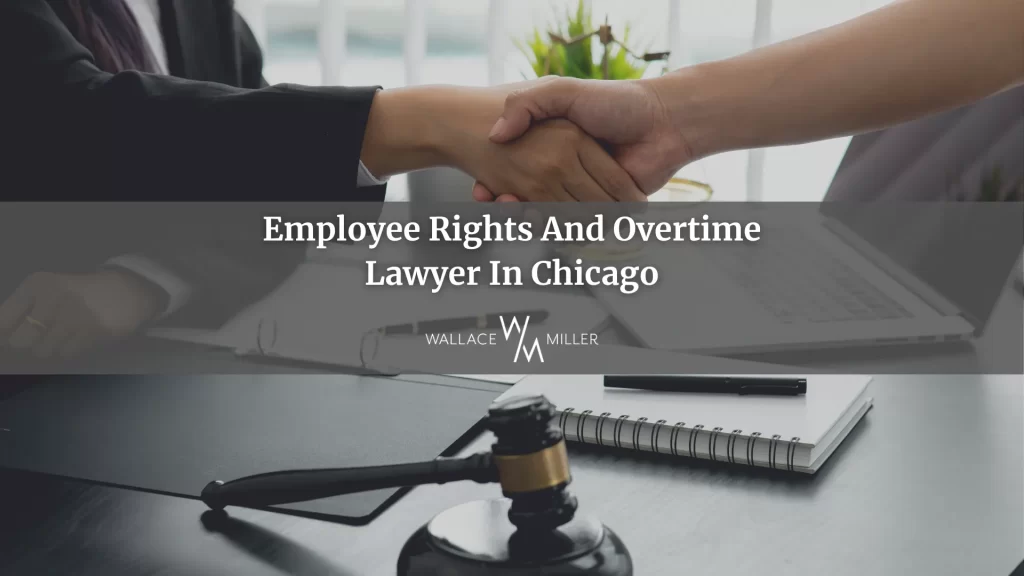
If your employer treated you unfairly, do not hesitate to contact the class actions and commercial litigation attorneys of Wallace Miller. We could represent you in your case to hold your employer accountable for their wrongdoing.
Employees have certain rights while working at any company. Employment laws protect them against unpaid overtime, discrimination, and other forms of mistreatment. You can and should pursue legal action when an employer violates those rights.
At Wallace Miller, we understand the devastation of working in an environment where you don’t feel valued or safe. Your employer took advantage of you and should face the consequences of their actions. We have decades of experience representing clients in employment cases involving a range of circumstances. You can count on us to be your advocate and fight for the compensation you deserve.
Call Wallace Miller for your free consultation with one of our employee rights and overtime lawyers at (312) 261-6193.
Federal Employment Laws
Every state has employment laws to protect workers in every job industry. Additionally, multiple federal laws offer protections. The three main types of federal employment laws are:
Fair Labor Standards Act (FLSA)
The Fair Labor and Standards Act establishes various standards that affect employees, including:
- Overtime pay
- Minimum wage
- Youth employment standards
- Record keeping
Employers that don’t pay their employees the overtime owed to them violate this federal law.
Occupational Safety and Health Act (OSHA)
OSHA protects an employee’s safety and health while at work. It provides the standards employers must follow to ensure safe working conditions. OSHA also establishes a standard every state must meet when creating plans for protecting different employees.
Family and Medical Leave Act (FMLA)
FMLA is another federal law offering specific protections to eligible employees. Employers must allow employees to take job-protected, unpaid leave for medical and family reasons. They must also provide continued health insurance coverage that meets the same conditions and terms as employees who are not on leave.
Employee Rights at the State Level
Each state has specific laws regarding a range of disputes involving employee rights and overtime. The most common include:
- Discrimination
- Occupational safety
- Wage and hours
- Misclassification
- Denied leave
- Whistleblower
- ERISA
- Harassment
- Unemployment and wrongful termination
Workplace Discrimination Laws
State laws and the Civil Rights Act of 1964 protect employees from discrimination in the workplace. The federal law prohibits discrimination based on an employee’s:
- Religion
- Sex
- Color
- Age
- Marital status
- National origin
- Disability
- Race
The U.S. Equal Employment Opportunity Commission (EEOC) enforces federal laws regarding discrimination in the workplace. Various agencies at the state level deal with state anti-discrimination laws.
Safety in the Workplace
OSHA protects an employee’s right to be safe while working. This federal law establishes various standards employers must meet to provide workers with safe working conditions. It also provides requirements regarding safety and training depending on the specific job industry.
Wage and Hour Laws
When it comes to wages, most employers must pay at least the minimum wage to nonexempt, covered employees. As of 2022, the federal minimum wage is $7.25. However, every state can impose its own minimum wage, and many choose to do so. That means your pay should be at least $7.25 per hour or the hourly minimum wage where you live.
Wage and hour laws also protect an employee’s right to overtime pay. Although not every state establishes specific regulations regarding overtime pay, most follow the standards provided by the Fair Labor Standards Act.
Employees who work beyond the forty-hour workweek should receive specific pay for the extra time. However, some job classifications, such as salaried and exempt employees, are ineligible for overtime pay.
Employee Misclassification
Disputes can arise when an employer misclassifies an employee. Two main distinctions often matter the most when it comes to employment law:
- Exempt or nonexempt employee
- Employee or independent contractor
As an employee, you have protections and rights under employment and labor laws. However, employers will sometimes misclassify an employee as an independent contractor or exempt employee to avoid paying overtime or providing various benefits.
Unpaid and Paid Leave
Taking time off from work for various reasons is expected. It might be for a holiday, vacation, or because the employee is sick. Paid time off (PTO) is available for many employees to use at their discretion. Employers are not allowed to deny PTO.
However, federal and state laws might require employers to provide their workers with unpaid leave under specific circumstances, such as:
- Military duty – The Uniformed Services Employment and Reemployment Rights Act, along with certain state laws, allows workers to take leave for military duty. Although the time off will be unpaid, employers must reinstate the employee upon return and cannot discriminate against them for their military service.
- Family and Medical Leave – FMLA requires employers with 50 or more employees to provide at least twelve weeks of unpaid leave each year for family or medical issues. Employees can receive these benefits without losing their jobs.
- Domestic violence leave – Multiple states enacted laws to protect employees who are victims of domestic abuse or violence. Employers in these states must allow a specific number of unpaid days off each year to seek legal assistance, obtain a restraining order, and other necessary actions.
- Jury duty leave – Federal and state laws protect employees who must serve on jury duty. Employers are not allowed to terminate employment for missing work.
Whistleblower Laws
A “whistleblower” is an employee who reports the illegal activity of an employer. Whistleblower protection laws prohibit employers from retaliating against employees who expose their misconduct by denying a promotion or overtime pay, demoting, terminating, or reducing hours or pay.
ERISA Laws
The Employee Retirement Income Security Act is a federal law that establishes standards to protect an individual’s rights to benefits through health and retirement plans in the private sector. Employers must provide these benefits to their employees if the plans fall under ERISA protection.
ERISA standards include:
- Protection against fiduciary wrongdoing
- Right to sue for breach of fiduciary duty
- Information regarding plan terms, such as coverage and costs
- Instructions on filing a claim or appeal
- Requirements for participation in a plan, such as funding and benefit accrual
Workplace Harassment Laws
State and federal laws prohibit the harassment of employees in the workplace. Federal and state anti-discrimination laws also protect employees against this behavior since harassment is a form of discrimination.
The definition of harassment is an unwelcome comment or action that creates a hostile or offensive work environment. Harassment can also involve an employer or executive using this type of action as a condition of the worker’s employment. Sexual harassment is a common type of harassment that occurs, but harassment can also involve an employee’s disability, age, or race.
Unemployment and Wrongful Termination
To be eligible to apply for unemployment benefits, an employee must leave their job through no fault of their own and meet specific requirements under unemployment laws. Some states are at-will states, which means an employer does not have to have a good reason to terminate someone’s employment.
However, some laws protect workers from wrongful termination due to factors such as:
- Taking FMLA leave
- Reporting harassment or discrimination in the workplace
- Pursuing action for an hour or wage issue
- Filing a workers’ compensation claim
- Additional issues federal and state employment laws cover
Retaliation by an Employer
Many states allow employers to fire employees for any reason since they are at-will states. However, violations of a federal or state employment law give workers the right to pursue legal action.
Employers are not allowed to retaliate against an employee for filing a complaint protected by these laws. Common examples of retaliation include:
- Transfer to a less desirable position within the company
- Reduce salary or wage
- Refuse to provide training
- Transfer to a different shift despite known scheduling conflicts with family responsibilities
- Demote to a lower position
Filing a Claim for Employee Rights Violations
 It is your right to file a claim if your employer violated your rights in any way. You should not fear retaliation or termination of employment by seeking legal action against them.
It is your right to file a claim if your employer violated your rights in any way. You should not fear retaliation or termination of employment by seeking legal action against them.
Wallace Miller could represent you in your claim involving a range of employment law issues, such as:
- Unsafe working conditions
- Overtime and wage disputes
- Discrimination during the firing or hiring process
- Sexual harassment
- Denied leave
You could recover compensation for unpaid overtime, sick leave, or another employee benefit you did not receive. You might also receive compensation for:
- Attorney’s fees
- Interest on the unpaid wage or overtime under state law
- Penalties
Our employee rights and overtime lawyers will aggressively pursue the maximum compensation owed to you for the overtime pay or wage your employer denied or for whatever other employee rights violation your employer committed against you. We will investigate the incident thoroughly and create a legal strategy to try to reach your desired outcome.
Statute of Limitations in Employment Law Cases
You must follow the statute of limitations for the type of employment law case you pursue. This statute establishes the timeframe you have to file your lawsuit against your employer. Every state has a different set of statutes. Federal law might also provide the timeframe for these cases, depending on the type of issue.
Some federal regulation violations require a specific procedure to bring a case against an employer. For example, if you file a complaint under the Fair Labor Standards Act, you must first submit a Right to Sue letter. This letter informs the court that you exhausted all administrative actions to resolve the dispute.
Contact Us
Wallace Miller understands how overwhelming it can be to suffer mistreatment by an employer and find yourself facing a complicated legal process. Many people don’t know employment laws and the protections employees have when employers violate their rights. You don’t have to sit idly by and allow your employer to mistreat you and deny the overtime pay you deserve.
Let the employee rights and overtime lawyers from Wallace Miller fight for you. We will guide you through every step and provide the support you need to get through this challenging time in your life. You can count on us to remain by your side until the end.
If your employer refuses to pay you for the overtime you worked or violated your employee rights somehow, call Wallace Miller right now for your free consultation at (312) 261-6193.

